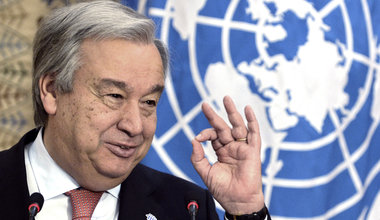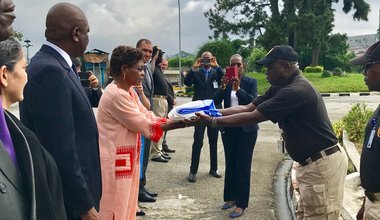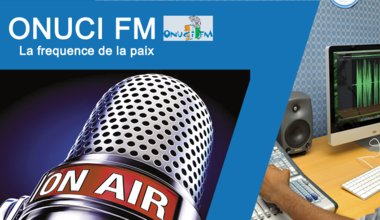Daily Brief on Cote d’Ivoire for Tuesday, 4 November 2008
Highlights
- SRSG and Ivorian Prime Minister launch Operation Transport
- FAFN ex-combatants threaten to demonstrate over unpaid allowances
- UNOCI and FAFN increase patrols to combat growing insecurity
Electoral process
The Special Representative of the UN Secretary-General for Côte d'Ivoire, Y.J. Choi, today handed over 34 UNOCI vehicles to Ivorian Prime Minister Guillaume Soro for use during the country's identification and voter registration operation in Abidjan and Bouaké during the next 45 days. 27 vehicles will be used in Abidjan while the remaining seven will be sent to Bouaké.
Meanwhile, the identification and voter registration operation, which was due to start in Bouaké at the end of this week has been indefinitely postponed. According to reports reaching UNOCI, the Chiefs of Staff of the Armed Forces of the Forces Nouvelles (FAFN) and the Defence and Security Forces of Cote d'Ivoire (FDSCI), Generals Soumaila Bakayoko and Philippe Mangou, have stated that the security situation needs to be improved before the operation can start.
DDR
UNOCI has received reports that some 4000 FAFN ex-combatants have presented an ultimatum to the Forces Nouvelles (FN) authorities threatening to block the north and south entry points into Bouaké and demonstrate in front of the FN Secretariat, unless they paid what they described as their "reinsertion allowances". The ex-combatants claim they are owed 500,000 FCFA ($1000) each. They have given a deadline of 6 November 2008.
Military
UNOCI's Sector East Commander, Brigadier-General Zafar Iqbal yesterday met with the FAFN's General Bakayoko to discuss the increased insecurity in the area. Both military leaders decided to increase the number and efficiency of patrols. For instance UNOCI is undertaking long range night patrols in the region of the Savanes, especially around Ferkessédougou, Boundiali and Korhogo. The decision follows the latest case of roadside robbery on a passenger minibus at Napié, 30 km south of Korhogo (north), during the night of 2 – 3 November 2008 by ten armed masked persons. Three passengers were wounded during the attack, and a number of personal belongings stolen. FAFN troops reportedly searched the area and killed two men alleged to have been involved in the attack.
Security
Growing insecurity persists in western Cote d'Ivoire with several attacks reported during the past four days. Yesterday, near Niouldé, a village situated 25 km from Guiglo along the Guiglo-Bloléquin road, five masked men armed with Kalachnikovs robbed people passing along the road. On 1 November 2008, in Grand Pin, 14 km from Bangolo, a group of unidentified individuals, masked and armed with kalashnikovs, machetes and hand-made weapons ambushed a vehicle transporting coffee and cocoa and raided the village. Four people were killed during the exchange of fire between the criminals and gendarmes from Bangolo Mixed Brigade. On the same day, the Médecins sans Frontières (MSF) Hospital in Bangolo was looted by a group of individuals armed with Kalashnikovs and knives. On 30 October 2008, in Dehiba village, 34 km north-east of Duekoué (west), 14 unidentified individuals, also armed with Kalashnikovs and machetes, robbed two people. During these attacks, the assailants destroyed property and stole 400 000 FCFA (approx $800), two bicycles and several personal belongings. The Bangolo Mixed Brigade has launched investigations.
Villagers in Liabo and Kountifla, near Daloa (centre-west) have complained to a UNOCI patrol about the frequent armed robberies along the roads leading in and out of their villages. They told the patrol that the armed bandits operate between their villages and Sinfra and that they feel that the local gendarmerie is doing very little to help them.
A female cocoa and coffee producer in Bounta, near Man (west) was allegedly physically assaulted by soldiers from the (FAFN), stationed in the village, after she refused to give them money. The woman, who was admitted at Man Hospital, and her husband reported the incident to UNOCI Military Observers who in turn raised it with FAFN authorities in Man.
Students from Bouaké University yesterday demonstrated and threw stones in protest at the small number of students who have been given education grants. A list published yesterday showed that out of 4000 applicants only 224 had been selected as beneficiaries. FAFN troops managed to disperse the demonstration without violence and the Prefet of Bouaké held a meeting with the students' representatives to calm the situation.
Human Rights
On 1 November 2008, the Human Rights Office in Odienné organized a human rights training for five presidents of human rights clubs and ten staff members from various secondary schools in the Denguélé region. Special emphasis was placed on the right to education and the fight against violence against women. The training was organized following the installation of the human rights club at the Lycée Moderne in Odienné on 31 October 2008 by the Office in collaboration with the Direction Régionale de l'Education Nationale (DREN) in Odienné. The installation ceremony was attended by more than 300 pupils and teachers from various schools in the area. Some 20 human rights clubs have been created in primary and secondary schools in Odienne since last year.
The Regional Human Rights Office in Duékoué (west), on 31 October 2008 organised a roundtable on the theme "Public Liberty in an Electoral Period" at the Audiovisual Complex in Man (west). The Office, which made a presentation on human rights and elections, told participants that respect for human rights was an essential element in free, fair and transparent elections. The aim of the roundtable was to sensitise the population on human rights and the electoral process.
A human rights training session was organised by the Regional Human Rights Office in Yamoussoukro (centre) on 28 October 2008, for 12 prison officers working in Toumodi (centre), Gagnoa and Oumé (centre west), at the Mayor's Office in Oumé, situated 65 km south of the political capital. The session highlighted the rights of detainees and prisoners and the discrepancies between international norms and the reality on the ground with regard to respect of the individual.
 ONU
ONU Nations Unies Maintien de la paix
Nations Unies Maintien de la paix




